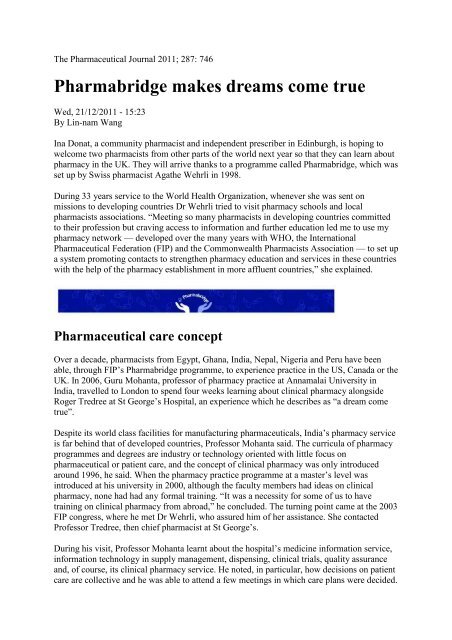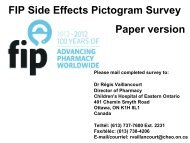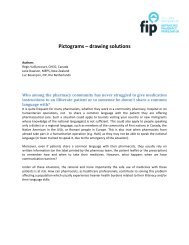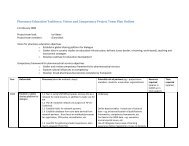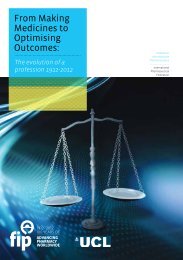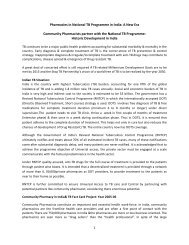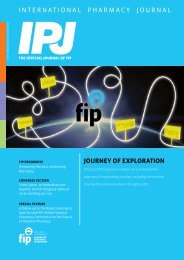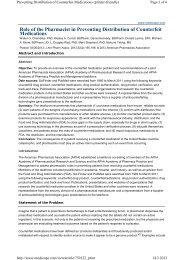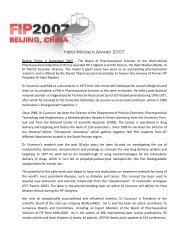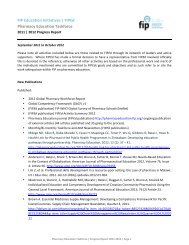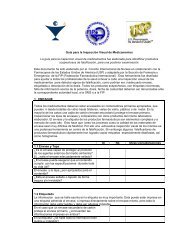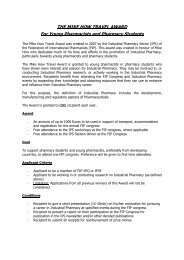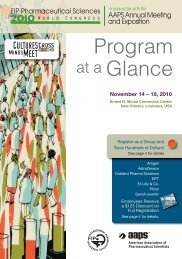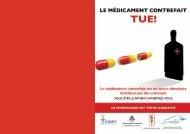Pharmabridge makes dreams come true - FIP
Pharmabridge makes dreams come true - FIP
Pharmabridge makes dreams come true - FIP
You also want an ePaper? Increase the reach of your titles
YUMPU automatically turns print PDFs into web optimized ePapers that Google loves.
The Pharmaceutical Journal 2011; 287: 746<br />
<strong>Pharmabridge</strong> <strong>makes</strong> <strong>dreams</strong> <strong>come</strong> <strong>true</strong><br />
Wed, 21/12/2011 - 15:23<br />
By Lin-nam Wang<br />
Ina Donat, a community pharmacist and independent prescriber in Edinburgh, is hoping to<br />
wel<strong>come</strong> two pharmacists from other parts of the world next year so that they can learn about<br />
pharmacy in the UK. They will arrive thanks to a programme called <strong>Pharmabridge</strong>, which was<br />
set up by Swiss pharmacist Agathe Wehrli in 1998.<br />
During 33 years service to the World Health Organization, whenever she was sent on<br />
missions to developing countries Dr Wehrli tried to visit pharmacy schools and local<br />
pharmacists associations. “Meeting so many pharmacists in developing countries committed<br />
to their profession but craving access to information and further education led me to use my<br />
pharmacy network — developed over the many years with WHO, the International<br />
Pharmaceutical Federation (<strong>FIP</strong>) and the Commonwealth Pharmacists Association — to set up<br />
a system promoting contacts to strengthen pharmacy education and services in these countries<br />
with the help of the pharmacy establishment in more affluent countries,” she explained.<br />
Pharmaceutical care concept<br />
Over a decade, pharmacists from Egypt, Ghana, India, Nepal, Nigeria and Peru have been<br />
able, through <strong>FIP</strong>’s <strong>Pharmabridge</strong> programme, to experience practice in the US, Canada or the<br />
UK. In 2006, Guru Mohanta, professor of pharmacy practice at Annamalai University in<br />
India, travelled to London to spend four weeks learning about clinical pharmacy alongside<br />
Roger Tredree at St George’s Hospital, an experience which he describes as “a dream <strong>come</strong><br />
<strong>true</strong>”.<br />
Despite its world class facilities for manufacturing pharmaceuticals, India’s pharmacy service<br />
is far behind that of developed countries, Professor Mohanta said. The curricula of pharmacy<br />
programmes and degrees are industry or technology oriented with little focus on<br />
pharmaceutical or patient care, and the concept of clinical pharmacy was only introduced<br />
around 1996, he said. When the pharmacy practice programme at a master’s level was<br />
introduced at his university in 2000, although the faculty members had ideas on clinical<br />
pharmacy, none had had any formal training. “It was a necessity for some of us to have<br />
training on clinical pharmacy from abroad,” he concluded. The turning point came at the 2003<br />
<strong>FIP</strong> congress, where he met Dr Wehrli, who assured him of her assistance. She contacted<br />
Professor Tredree, then chief pharmacist at St George’s.<br />
During his visit, Professor Mohanta learnt about the hospital’s medicine information service,<br />
information technology in supply management, dispensing, clinical trials, quality assurance<br />
and, of course, its clinical pharmacy service. He noted, in particular, how decisions on patient<br />
care are collective and he was able to attend a few meetings in which care plans were decided.
“The learning and experience I gained during the month was substantial and will help me in<br />
my teaching to my students of clinical pharmacy. I propose to share my experience with other<br />
pharmacy institutions,” he said.<br />
For Professor Tredree, the challenge was to fit the placement into an already busy training<br />
timetable and to arrange accommodation close to the hospital at a reasonable price<br />
(<strong>Pharmabridge</strong> gives the visiting pharmacist a grant towards travel and accommodation), but<br />
this was achieved by planning six to eight months in advance. The rest was relatively easy<br />
because <strong>Pharmabridge</strong> liaises with the visiting pharmacist, he said.<br />
“In the UK we practise pharmaceutical care to a high standard and to be able to share our<br />
skills is an important way to contribute to the development of pharmacy around the world,” he<br />
said. “I would encourage others to take part because the candidates have a high level of<br />
commitment and benefit enormously from interactive training,” he added.<br />
Global networking<br />
Finding suitable accommodation in Edinburgh can be a hindrance (eg, there is no hospital<br />
accommodation), so Ms Donat is offering her visitors use of her spare room. It will be her<br />
second year offering a placement: in 2009 she was host to Anantha Nagappa, professor of<br />
pharmacy management at Manipal University, India. During his three-week placement, he<br />
shadowed Ms Donat at various Boots pharmacies and visited schools of pharmacy in<br />
Aberdeen, Glasgow and London as well as the Scottish headquarters of the Royal<br />
Pharmaceutical Society, talking to people about pharmaceutical care.<br />
Professor Nagappa said he was inspired by the role of community pharmacist in health care<br />
and has since given 30 motivational lectures across India to start community pharmacy<br />
services. The candidates who are on <strong>Pharmabridge</strong>’s list are pharmacists who are driving<br />
good pharmacy practice in their own countries. Ms Donat said that she and her colleagues<br />
benefited from having someone enthusiastic looking at how things were done with “a<br />
completely fresh and critical pair of eyes” and this led to many lively debates about the<br />
business of pharmacy practice.<br />
She is now preparing to wel<strong>come</strong> a pharmacist from Sudan, although the placement is taking<br />
some time to confirm due to the country’s political situation and difficulties in accessing<br />
email and telephone. She says the placements allow her to “offer something to advance<br />
pharmacy in the widest possible sense” and give hosts a glimpse of another person’s world.<br />
They allow you to find out what others need, for example, in terms of donating books.<br />
And, finally, you can make friends. Ms Donat has never been to India, but perhaps one day<br />
she will take up the invitation of her last visitor. She added that on his arrival Professor<br />
Nagappa had also given her a packet of “the absolutely best cardamom ever!”.<br />
Find out more<br />
Readers who think they may be able to offer the opportunity for a pharmacist to experience<br />
pharmacy in the UK, or who would like further details can visit www.pharmabridge.org or<br />
contact Agathe Wehrli at wehrlia@bluewin.ch


